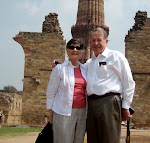

We have just completed the designated five days of the most important Hindu holiday in India, which is celebrated by Hindu and non-Hindu alike. It is also a special occasion for Hindus throughout the world. Divali, as most of us here call it, is known as the Festival of Lights. We have thought of it somewhat like Christmas, New Years and 4th of July, all rolled into one big holiday. As I have read about Divali, I realize our celebration at Rising Star, was very small, compared to how it is celebrated throughout India, but our children loved what occurred, and seemed happy with it all.
A little history that I have learned about Divali. The festival is calculated by the lunar, Hindu calendar. It will appear somewhere in the end of October or early November. The word Divali means "rows of lighted lamps" so, it is traditionally marked by lighting deeyas (or diyas), which are made from clay and filled with oil or ghee (they remind me of the ones we purchased in the holy land that are replicas of those from Biblical days.) People get ready for this great holiday by cleaning their homes and surroundings, the purchasing and wearing of new clothing and giving charity to the needy. The stores were jammed the week before Divali began. Fireworks are a big part of the celebration, which was one thing we did with the children: firecrackers and sparklers are especially important. Sweets are distributed (ours were more in the form of several sweet dishes as part of the meal), gifts are exchanged, homes decorated and oil lamps are lit. We also had two goats, alive on Sunday, but covered with a curry sauce on Monday! Don't quite know how that fit into the Hindu holiday! We had a lot of nice clothing in the storeroom that people had donated to us, so each boy and girl got a new article of wearing apparel for the day, although for the evening excitement the girls had lovely outfits (many new from their families) especially for the holiday.
Being the festival of lights, one thought is to wake up from the slumber of ignorance and pursue knowledge. As light dispels darkness, so should knowledge dispel ignorance. Through learning, man is expected to advance to the stage of enlightenment in which he realizes that God is the Light of lights, and that God brings warmth, love, and illumination to all being and therefore there can be no light greater than God. The aim of Divali celebrations is to get man moving on the spiritual path and ultimately attain illumination by becoming one with God. As they light the lamps in their houses, those celebrating divali are reminded to light the lamps of wisdom, goodness and God-consciousness in themselves. It is through this, that they can attain the "Light of Lights"--God.
The festival is held in honor of Lakshmi, the Hindu goddess of wealth and prosperity. They pray to Lakshmi for good luck in the coming year. The lights are left burning all night, so that Lakshmi may feel welcome and enter. The more lamps that are lit, the more likely it is that Lakshmi will be tempted to visit them. Hindus believe she brings wealth when she visits.
Our employees all took at least two days off (plus the weekend)--family gatherings are very important, so many of them have to travel quite a distance to be with family. Including the weekend, our children were out of school for four days, so that in itself was a celebration for them. Our fireworks were very minor, but across Tamil Nadu they were incredible--even the most humble home has a display that makes our big 4th of July celebrations look pretty minor. I have never heard so many firecrackers in my life!
It was exciting to be a part of this great holiday.










